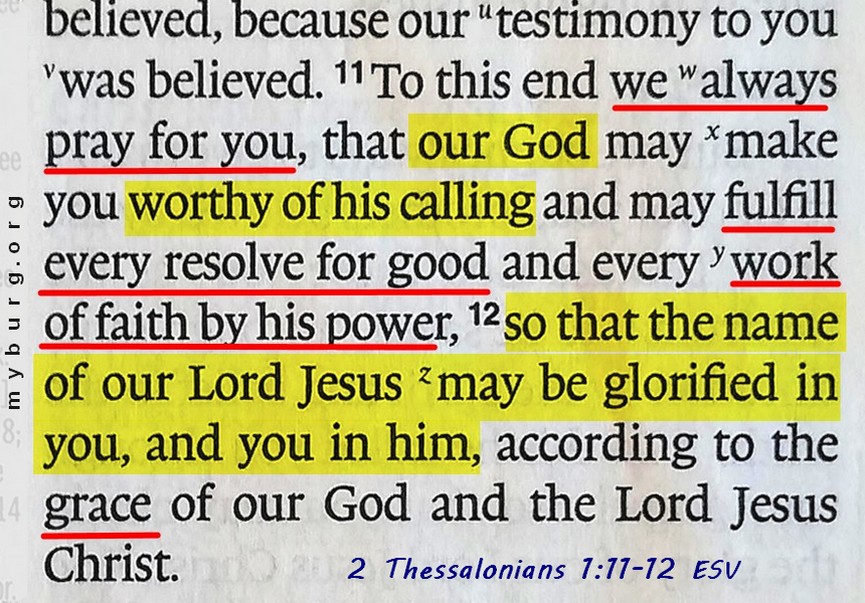bible reading apr 9-11

Bible reading for weekend April 9 -- 11
Apr 9 -- Proverbs 27 and 2 Thessalonians 1
Apr 10 -- Proverbs 28 and 2 Thessalonians 2
Apr 11 -- Proverbs 29 and 2 Thessalonians 3
"Do not forsake your friend and your father's friend, and do not go to your brother's house in the day of your calamity. Better is a neighbor who is near than a brother who is far away." (Proverbs 27:10)
FRIENDSHIP (ch 27). Our families have an important role in God's plan, but so do our friends and neighbors (vv 9-10; see vv 6, 14, 17). Cultivation of good relationships will bear fruit now and in the future. The application of the extended proverb, "know well the condition of your flocks" (vv 23-27), applies not only to farming, but also to public service, to the ministry, and to friendships generally. By our care for others we cultivate righteousness and invest in our own future. Good friendships are a big part of the good life (Mark 10:29-30). As you read ask yourself, what does it mean to be a good friend or a good neighbor?
THE PUBLIC GOOD (ch 28-29). These chapters conclude Solomon's collection of proverbs. An overarching theme here is that of public justice founded upon God's law. Interwoven through this are the related themes of righteous rule, integrity and stability in leadership, trusting the Lord, not fearing evil opposition, fair treatment of the poor, and opposing the vices of wickedness, gluttony, greed, and indolence. To truly understand justice we must seek the Lord and submit to his word (28:4-5, 7, 9). A wicked nation will be characterized by strife and mockery (29:8-9, 22). Those who love righteousness will hate wickedness, and vice versa (29:27; cf Rom 12:9). "Truth always seeks to be honored as truth and can never be at peace with error and deception." (Herman Bavinck) As you read these chapters, think about how these proverbs relate to what we see happening in our world today.
================
"To this end we always pray for you, that our God may make you worthy of his calling and may fulfill every resolve for good and every work of faith by his power, so that the name of our Lord Jesus may be glorified in you, and you in him, according to the grace of our God and the Lord Jesus Christ." (2 Thessalonians 1:11-12)
WORTHY OF THE CALLING (ch 1). This is Paul's second letter to these young believers, written soon after the first. They are a bit confused about Christ's second coming, and are also experiencing much opposition for their Christian faith. Twice Paul speaks of them being found worthy of their calling (vv 5, 11). One reason for persecution and suffering in this world is so that God's people might willingly embrace their identification with Christ and thus show that they belong to him. They share in his suffering, but, as Paul says, they will also share in his glory: "that the name of our Lord Jesus may be glorified in you, and you in him" (v 12; cf Phil 3:10-11). We who identify with Christ in his rejection will be glorified with him in his victorious return (Rom 8:21, 29-30; Heb 2:10). This chapter also clearly teaches the truth of eternal judgment (v 9; cf Dan 12:2; Matt 25:46; John 5:29; Acts 24:15; Rev 14:11; 20:15; 21:8).
HOW HUMAN HISTORY ENDS (ch 2). Many today think that humanity is getter better and better. People feel that their favorite leaders -- along with their programs, science, technology, education, and progressive thinking -- will bring about utopia on earth. But the Bible clearly tells us that all of this will ultimately result in self-worship, the deification of humanity, and then its collapse. Because people do not want to hear the truth, nor love the truth, the truth shall be hidden from them. Paul's conclusion: "So then, brothers, stand firm and hold to the traditions that you were taught by us, either by our spoken word or by our letter" (2:15). Who is the "man of lawlessness" Paul speaks of (vv 3-4)? Read more here.
FINALLY, BROTHERS... (ch 3). Paul calls for prayer, that the gospel might "speed ahead and be honored" (v 1). And he will conclude with an exhortation for them to work and support themselves. Think about his encouraging words, "But the Lord is faithful. He will establish you and guard you against the evil one" (v 3). What does it mean to be protected from the evil one? Read more here.
A FINAL QUOTE. "Man is now thinking out a Bible for himself; framing a religion in harmony with the development of liberal thought; constructing a worship on the principles of taste and culture; shaping a god to suit the expanding aspirations of the age. ... The extent of the mischief no one can calculate. A soul without faith, a church without faith, a nation without faith, a world without faith -- what is to be their future? What is their present? When faith goes, all good things go. When unbelief comes in, all evil things follow." (Horatius Bonar, 1808--1889)
About this newsletter: I post three times a week on my Bible reading, following the Robert Murray M'Cheyne (RMM) two-year reading schedule, as arranged by D. A. Carson. Scripture quotations, unless otherwise noted, are from The ESV® Bible (The Holy Bible, English Standard Version®), copyright © 2001 by Crossway, a publishing ministry of Good News Publishers. Used by permission. All rights reserved. Another resource I recommend is the NET Bible with its excellent notes at netbible.org.